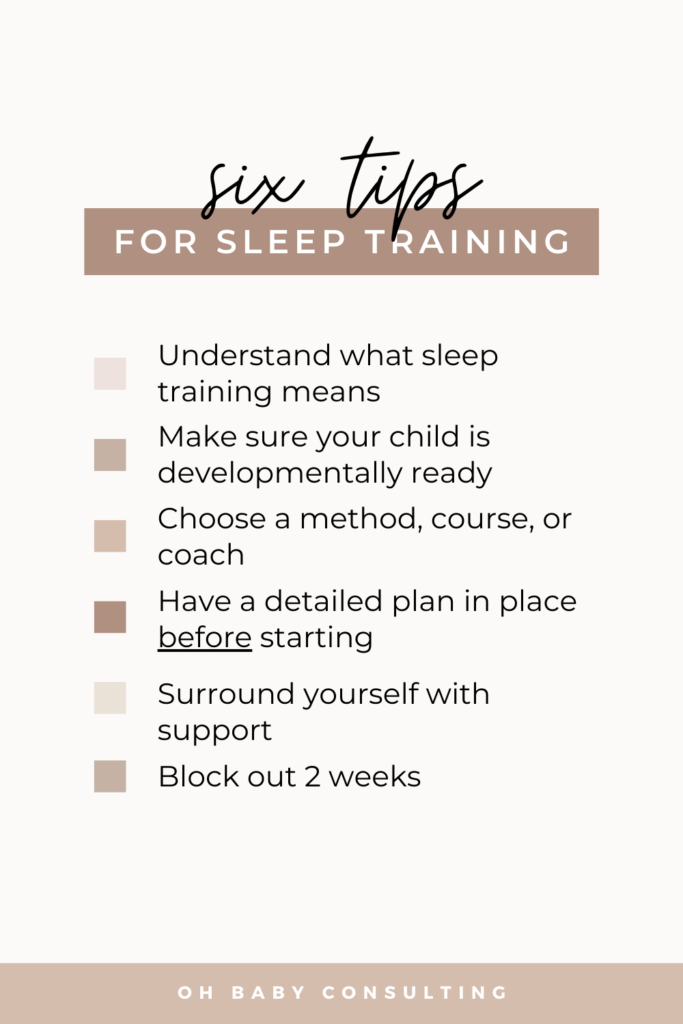Deciding to begin sleep training can be both exciting and overwhelming. In a world where information is readily available through a simple Google search, the options + opinions seem limitless. Now on top of being tired, you’re navigating through this sea of information and trying to determine the best method for your unique situation. And once you’ve chosen a method, there’s still questions like, what schedule should your child be on? Do they still need night feeds? What happens at nap time? What if this process doesn’t work?
If getting better sleep is a top priority for you, having a well-thought-out plan is key. To help you kick off your journey to sleep training successfully, here are my go-to tips to get you started on the right foot.
1. Understand the premise
What are you really trying to do when sleep training?
While immediate concerns like making bedtime easier, reducing or eliminating night wake ups, and/or mastering independent napping often drive families to explore sleep training, its fundamental purpose is to equip your child with lifelong tools and skills for becoming and staying a great sleeper.
When I work with families, my goal – aside from helping your family sleep better – is to build positive sleep associations and to help your child learn to be in charge of their own sleep journey rather than relying on someone or something else to facilitate it. Learning to sleep independently, like any other developmental skill, takes practice. So, consider sleep training yet another important parenting decision to help your tired little one get the rest they need to grow and develop.
2. Ensure your child is at an appropriate age and developmental stage
In general, healthy babies with no underlying medical issues can begin formal sleep training between 12-16 weeks adjusted age. (But the best time to start has actually nothing to do with age!)
If you have a newborn, there are still things you can do! The foundations you lay now may even help you avoid sleep training down the line!!
Please consult with your pediatrician prior to beginning any form of sleep training.
3. Choose a method, course, or coach that you feel comfortable with
Here’s where you have many options to choose from. Consider:
- Are you a DIY-er ready to sift through and source information yourself?
- Do you want to do it yourself but would like a guide or roadmap handed to you?
- Would you feel better having an expert help you create a personalized sleep plan for your family?
- Do you want someone to come to your home and be by your side through the process?
- How much crying can you tolerate?
Sleep training methods exist on a spectrum ranging from very hands-on to minimal/no interaction. Part of sleep training effectively is first understanding the various methods and then aligning yourself with one that not only feels doable for you but one that you think would be in the best interest of your child.
My courses include methods in the middle of these extremes and in my custom plans I often blend techniques to create something that will work effectively for your family.
4. Ensure you have a detailed plan in place before starting…
…and one that you feel comfortable implementing both at bedtime and again during any night wake ups.
The last thing you want is to be doing is flipping through pages of a book, scrolling through blog posts, or trying to index problems when your baby is screaming at 3 a.m. Make sure you are very clear with how to handle bedtime routines & protests, night wakes & feedings, and nap refusals & short naps. Showing up for your baby with consistent responses is the number one way to ensure there is no unnecessary crying involved and your baby learns this new skill quickly and effectively. Clear is kind!!
If you're overwhelmed with the options or feeling lost on where to start, my courses + custom plans will do all the prep-work for you. Plans include daily feed + sleep schedules, pre-sleep routines, and strategies for bedtime, night wakes, and naps. No incomplete plans here!!
5. Surround yourself with support
Sleep training is hard (as all change is). There are going to be moments when you’re questioning yourself and wondering whether you’re making the right choice. Sometimes you’ll need a shoulder to lean on or someone to keep you accountable. You may have situations that come up that you’re not sure how to handle. And you’ll definitely want someone to celebrate with the first time your baby sleeps through the night or takes a 2-hour nap on their own. If you’re not working with a sleep coach make sure your partner is on board and keep a close friend on speed-dial (bonus points if they’ve “been there done that” with sleep training too!)
6. Block out 2 weeks to maintain 100% consistency
New skills take practice; learning how to sleep independently is no different. The more opportunities you give your baby to practice, the quicker they will become a great little sleeper!
Now that you understand what’s involved, it’s time to dive into sleep training! But if it all still seems a bit daunting (I get it) or you crave support through the process (I’m that way too), please reach out and let’s get a plan in place to get your family the rest you deserve!














